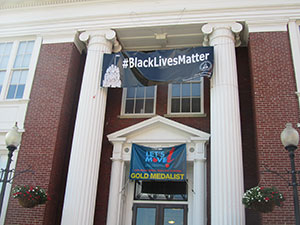By Haley ED Houseman

The #BlackLivesMatter banner hung at City Hall represents a commitment by the city to uphold the rights of African Americans, according to Mayor Joseph Curtatone.
The Black Lives Matter movement has been sweeping across the nation since the shooting death of an unarmed, black 18 year old in Ferguson, Missouri, at the hands of police.
The event occurred a little over a year ago, and has awoken a sustained period of unrest across the United States. In the wake of the shooting and the subsequent protests in the city, there have been demonstrations staged in communities large and small. A series of protests were held in the Boston area, most notably a Medford demonstration in January that shut down portions of I-93 during the morning rush hour commute.
Reactions within the community to such actions have been mixed, despite the movement’s intent to be supportive toward a community beleaguered with police brutality and mass incarceration. Black Lives Matter, a nebulous but forceful presence both on the ground at protests and on the Internet through the hashtag #BlackLivesMatter, has most recently brought the issues it represents to the attention of the Greater Boston area through work with the Somerville mayor’s office.
On Thursday, August 20, Somerville’s City Hall unveiled a banner strung across the front of the building, reading “#BlackLivesMatter, City of Somerville, Somerville Police Department”. The local Cambridge chapter of Black Lives Matter helped to hoist the banner in conjunction with the mayor’s office, but were not available for comment. However, this public support for the movement was further endorsed by Mayor Curtatone, who published an opinion piece in Commonwealth Magazine the next day. Said the mayor in an interview with The Somerville Times, “We are making a statement as well as asking ourselves some important questions. It’s a moment of self-examination. As an elected official I have responsibility to lead this conversation.”
It is a conversation that has dominated the headlines, as cities in particular have struggled individually to respond to charges of systematic and institutionalized racism in the country. In recent years, statistics and citizen journalism alike have revealed how black Americans are suffering higher rates of arrest, incarceration and violence, prompting many to examine how far we have, or have not come, since the Civil Rights movement. The statistics regarding the relationship with black Americans and police needs to be acknowledged, the mayor said. “Mass incarceration and police violence need to be recognized. We cannot repeat the mistakes of the past.”
When asked what concrete goals he hopes to see achieved through a public recognition of the Black Lives Matter movement, the mayor described a grassroots approach to change. “We as a nation are only going to witness a shift if the cities and municipalities lead the way.” In addition to a series in Somerville called the Conversions Project, centered around discussions of ethnic diversity in the city, the city is moving forward with anti-racism training for the police and other city departments. The mayor would also like to focus on fostering more dialogue – in schools, in communities, on the ground level.
This move to promote awareness and dialogue is not just a function of the mayor’s office. “We certainly want to invest in providing training for all city departments, not just police,” says Curtatone. “We also want to engage the city residents in dialogue. Solutions are not going to come from the mayor. They’re going to come from the city, from the residents. We want to be a national example, to move and lead social change.” In its public display of support, the city is certainly leading the way in the local conversation.
There has been criticism of the protest actions taken in support of Black Lives Matter, especially of the Medford protests that shut down I-93. The focus, said the mayor, should not be on the tactics, but on the root of the actions. “We’ve seen the greatest struggles for change through civil disobedience. Where would we have been without the civil disobedience Martin Luther King Jr., of Nelson Mandela, of Gandhi?” Such disobedience, he notes, is meant to inconvenience us, to cause discomfort and prompt discourse. Such conversations are rarely painless, but should not be ignored because they disrupt. “The question should be asked what is driving that discourse, that civil engagement. It is the anguish, the pain, the statistics that are driving this movement.”
Says Curtatone, “We’re never going to see significant change without a commitment to face it head on, it may be uncomfortable, it may inconvenient, but we should hate injustice more than we hate discomfort or inconvenience.”












Reader Comments